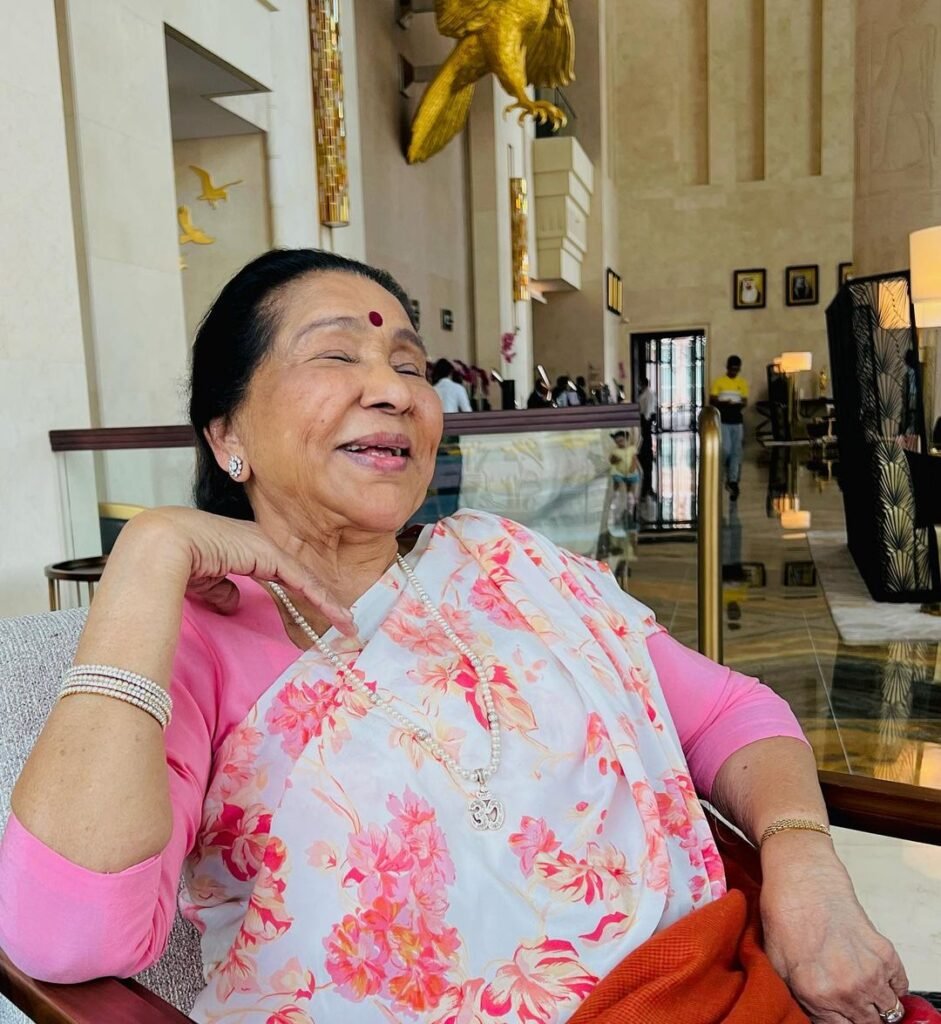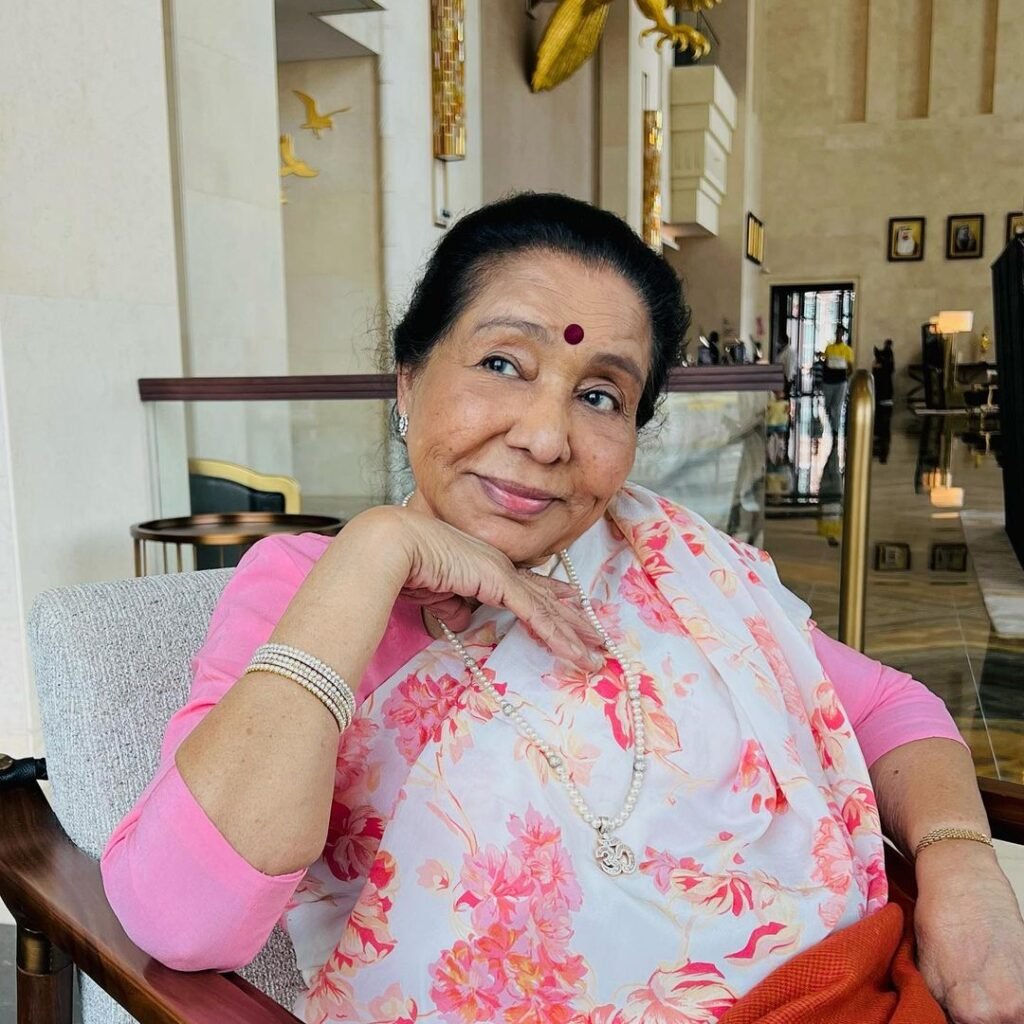Asha Bhosle needs no introduction, her name synonymous with a rich musical legacy. She’s a vocal marvel, having excelled in every genre from foot-tapping dance numbers to soul-stirring ghazals. Her music has transcended time, enchanting generations since the 1940s. Even today, she remains one of India’s most cherished artists. With a vast repertoire of over 11,000 songs spanning 20-plus languages, there’s an Asha Bhosle track for every occasion. Let’s explore the top 10 songs by this legendary singer that can elevate your retro-themed night. Read on and be sure to add these timeless classics to your playlist!

Dum Maro Dum
“Dum Maro Dum” is an iconic song sung by the legendary Asha Bhosle for the 1971 Bollywood film “Hare Rama Hare Krishna.” Composed by R.D. Burman and penned by Anand Bakshi, this song is celebrated for its psychedelic and groovy vibes, which perfectly capture the spirit of the 1970s counterculture. The song is picturized on Zeenat Aman, who was one of the leading actresses of that era. “Dum Maro Dum” became an anthem for the youth, reflecting their rebellious and free-spirited attitude. Asha Bhosle’s powerful and husky voice, combined with the innovative music arrangement, made this song an instant hit, and it remains a classic in the history of Indian film music. The song’s lyrics, which include the famous line “Hare Krishna, Hare Ram,” became synonymous with the counterculture movement of the time, making it a cultural phenomenon and a timeless piece of musical art.
Aaiye Meherbaan
“Aaiye Meherbaan” is a timeless classic song from the 1958 Bollywood film “Howrah Bridge.” This enchanting song is a beautiful blend of melody and sensuousness. It features the legendary actress Madhubala, whose graceful charm perfectly complements the soothing voice of Asha Bhosle, who lent her vocals for the song. The song’s picturization on the iconic Howrah Bridge in Kolkata adds to its nostalgic charm. “Aaiye Meherbaan” has not only stood the test of time but also continues to be a favorite in retro music collections, showcasing the magic of a bygone era of Indian cinema.
Parde Mein Rehne Do
“Parde Mein Rehne Do” is a classic Hindi song performed by the legendary playback singer Asha Bhosle. It was composed by the renowned music director Rahul Dev Burman and penned by Majrooh Sultanpuri. This timeless song was featured in the 1971 Bollywood movie “Shikar.”
Yeh Ladka Hai Allah
“Yeh Ladka Hai Allah” is a timeless Hindi song that was melodiously rendered by the legendary playback singer Asha Bhosle. This enchanting song was composed by the renowned music director duo, Laxmikant-Pyarelal, and featured in the 1977 Bollywood movie “Kabhi Kabhie.” The song’s heartwarming lyrics were penned by Sahir Ludhianvi. “Yeh Ladka Hai Allah” is a celebration of love and romance. It beautifully captures the essence of young love and the exhilaration of finding one’s soulmate. The lyrics express the admiration and deep affection felt by the protagonists in the movie.
Abhi Na Jao Chodkar
“Aabhi Na Jao Chhodkar,” sung by the legendary Asha Bhosle, is a timeless classic in the world of Indian music. This hauntingly beautiful song was featured in the 1961 Bollywood movie “Hum Dono” and composed by the maestro Jaidev. The lyrics were penned by the eminent poet and lyricist Sahir Ludhianvi. Asha Bhosle’s enchanting voice added depth and emotion to the song, making it a memorable and emotional experience for listeners. “Aabhi Na Jao Chhodkar” is often considered one of the most beautiful and soul-stirring songs ever recorded in the history of Indian music. Its enduring appeal and ability to evoke deep emotions have made it a classic love ballad that continues to be cherished by music enthusiasts and Bollywood fans alike.
Yeh Mera Dil
“Yeh Mera Dil” is a classic Hindi song sung by the legendary Asha Bhosle and composed by the musical maestro R.D. Burman. This timeless track is from the 1978 Bollywood film “Don,” starring Amitabh Bachchan and Zeenat Aman. The song is known for its seductive and captivating melody, which perfectly suits Zeenat Aman’s glamorous cabaret dance performance in the movie. Asha Bhosle’s sensuous and powerful voice, coupled with R.D. Burman’s music, creates a spellbinding ambiance. The song’s lyrics, penned by Anjaan, depict a woman’s feelings of love and longing. The memorable opening lines, “Yeh mera dil pyar ka deewana,” have become iconic in the world of Indian music. “Yeh Mera Dil” is celebrated not only for its musical brilliance but also for its unforgettable picturization in the movie, featuring Zeenat Aman in a shimmering gold outfit. The song has left an indelible mark on Indian cinema and music, and it continues to be a favorite choice for dance performances and retro playlists. This track showcases the incredible synergy between Asha Bhosle’s vocals and R.D. Burman’s composition, making it a timeless gem in the treasure trove of Bollywood music.
Aao Na, Gale Laga Lo Na
“Aao Na, Gale Lagao Na” is a sensuous and melodious Hindi song sung by the iconic Asha Bhosle. This song is from the 1971 Bollywood film “Mere Jeevan Saathi,” starring Rajesh Khanna and Tanuja. Composed by the prolific R.D. Burman, the song’s music is known for its captivating and romantic tunes. Asha Bhosle’s enchanting vocals add a layer of passion and depth to the song, making it one of the memorable romantic melodies of its time. The lyrics, penned by Majrooh Sultanpuri, express the yearning and desire between lovers. The opening lines, “Aao Na, Gale Lagao Na,” have become emblematic of the song’s romantic essence.
Chura Liya Hai Tumne
“Chura Liya Hai Tumne” is a timeless Hindi song sung by the legendary Asha Bhosle and Mohammed Rafi. It’s from the 1973 Bollywood classic, “Yaadon Ki Baaraat,” directed by Nasir Hussain. This song has etched its place in the annals of Bollywood music as one of the most romantic and melodious tunes. The song, composed by R.D. Burman, is celebrated for its soulful and seductive melody. The opening guitar riff is instantly recognizable and sets the mood for romance. The lyrics, penned by Majrooh Sultanpuri, speak of stolen moments and unspoken love. Asha Bhosle’s and Mohammed Rafi’s voices bring out the passion and longing portrayed by the two lead characters in the film. The song features the iconic Zeenat Aman and Vijay Arora and encapsulates the essence of young love.
In Aankhon Ki Masti Ke
“In Aankhon Ki Masti Ke” is an enchanting song performed by the legendary Asha Bhosle for the 1981 Indian film “Umrao Jaan.” Composed by Khayyam and penned by Shahryar, the song is an embodiment of timeless elegance and sophistication. Asha Bhosle’s melodious voice adds depth to the song’s emotive lyrics, which are a poetic celebration of beauty and allure. The music is adorned with classical Indian instruments, giving it a rich, cultural essence. The song captures the essence of the film and the mesmerizing beauty of the character portrayed by Rekha in “Umrao Jaan.” “In Aankhon Ki Masti Ke” remains an evergreen classic, a symbol of the enduring appeal of Asha Bhosle’s voice and the musical excellence of Indian cinema. It’s a masterpiece that continues to captivate listeners with its timeless charm.
Piya Tu Ab To Aaja
“Asha Bhosle’s ‘Piya Tu Ab To Aaja’ is a scintillating song that epitomizes the essence of Bollywood’s cabaret era. Featured in the 1971 movie ‘Caravan,’ the song is known for its electrifying performance by the iconic actress and dancer, Helen. Composed by R. D. Burman and penned by Majrooh Sultanpuri, this track is a classic example of the bold and vivacious music that was synonymous with that era. Asha Bhosle’s rendition is both seductive and playful, perfectly complementing Helen’s energetic dance moves in the movie. The song’s catchy tune and memorable chorus, ‘Monica… oh my darling,’ have made it a timeless favorite. The use of rock and roll elements in the music adds an element of Western influence to the Indian film music of that period. ‘Piya Tu Ab To Aaja’ is not just a song; it’s an experience. It represents the cultural amalgamation and experimental spirit of the era, and it continues to be a beloved part of Bollywood’s musical heritage.”



